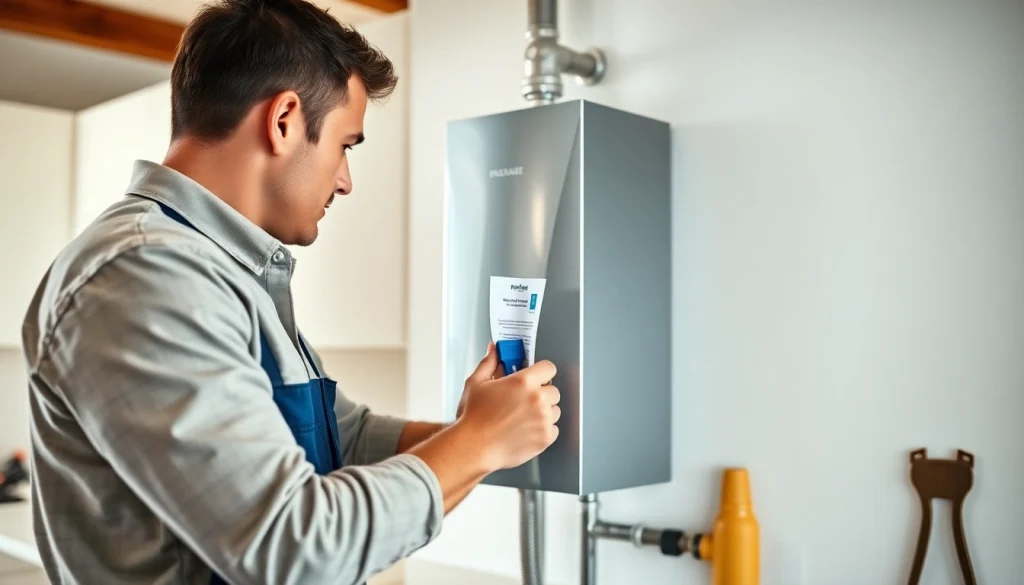Expert Water Heater Installation in Raleigh: Your Guide to Professional Service

Understanding Water Heater Installation in Raleigh
When it comes to water heater installation raleigh, homeowners face a variety of decisions that can significantly impact their comfort, energy efficiency, and overall satisfaction with their plumbing systems. Understanding the factors involved in this crucial home improvement task is essential for making informed choices. The installation process can seem daunting, yet with the right information, selecting an appropriate water heater and hiring a professional installer can be straightforward and stress-free.
Types of Water Heaters Available
Today’s market offers several types of water heaters, each with different advantages and functionalities. Here’s a rundown of the most common options:
- Tank Water Heaters: These traditional systems store a large volume of hot water, which is readily available for household use. Typically powered by gas or electricity, tank water heaters have a capacity ranging from 20 to 80 gallons.
- Tankless Water Heaters: As the name suggests, these units heat water on demand instead of storing it. This results in reduced energy costs and longer service life, making them a popular choice for environmentally conscious homeowners.
- Heat Pump Water Heaters: Utilizing electricity and ambient heat, heat pump water heaters offer an efficient alternative for heating water, capable of cutting energy costs significantly. They are ideal for regions with moderate climates, making them suitable for many Raleigh homes.
- Hybrid Water Heaters: Combining features of tank and tankless systems, hybrid units are designed for efficiency, offering both storage and on-demand heating capabilities.
Benefits of Professional Installation
Engaging a licensed professional for your water heater installation comes with numerous benefits:
- Compliance with Local Codes: Professionals are well-versed in local building codes and regulations, ensuring your installation adheres to legal standards.
- Safety: The risk of mishaps is significantly reduces when professionals handle the installation, safeguarding you and your home from potential hazards.
- Efficiency and Longevity: Proper installation means your unit will operate more efficiently and have a longer lifespan. This translates into lower energy costs and less frequent replacements.
- Warranty Protection: Many water heater manufacturers require professional installation to validate warranties, safeguarding your investment.
Key Considerations Before Installation
Before proceeding with water heater installation, homeowners should consider several factors:
- Size and Capacity: Assess your household’s hot water needs to choose a heater with adequate capacity. A too-small unit may run out of hot water, while a too-large one can result in wasted energy.
- Energy Efficiency: Opt for units with high energy efficiency ratings to minimize long-term operating costs. Look for the ENERGY STAR label, which indicates a product meets strict efficiency criteria.
- Fuel Source: Determine whether you prefer electric, gas, or solar-powered systems. The availability and cost of energy in your area will influence this decision.
- Location: Consider where the installation will take place, ensuring there’s ample space and accessibility for maintenance and replacement in the future.
Choosing the Right Water Heater for Your Home
The right water heater can enhance your home’s comfort and energy efficiency. Several factors can guide you in making the right decision:
Factors Influencing Your Decision
When selecting a water heater, consider the following elements:
- Household Demand: The number of family members and your water usage patterns dictate your capacity needs. Larger households might benefit from larger tank water heaters or highly efficient tankless models.
- Budget: Installation costs can vary significantly. While tankless heaters often carry higher upfront costs, they can save money over time through energy efficiency.
- Environmental Impact: As awareness of sustainability grows, many homeowners opt for eco-friendly units that reduce their carbon footprint and energy consumption.
Energy Efficiency Ratings Explained
Understanding energy efficiency ratings is vital for selecting an economical water heater:
- EF Rating: The Energy Factor (EF) rating measures a water heater’s efficiency. A higher EF indicates better energy efficiency, so choose products with the highest ratings available.
- A.F.U.E: For gas water heaters, the Annual Fuel Utilization Efficiency (AFUE) rating assesses how efficiently a heater uses fuel. This is essential for predicting energy costs over the unit’s lifespan.
Local Climate and Its Impact
Raleigh’s moderate climate can influence your choice of water heater. In regions where freezing temperatures can pose risks, consider insulated tanks or heaters specifically designed for colder environments. Additionally, heat pump heaters may be more effective in warmer temperatures, delivering notable energy savings.
The Water Heater Installation Process
Understanding the installation process helps homeowners prepare for what to expect. Here’s a detailed look:
Step-by-Step Installation Overview
The water heater installation process typically follows these steps:
- Preparation: Ensure the area is clear, check local codes, and obtain any necessary permits.
- Removal of the Old Unit: The professional will disconnect and remove the existing water heater safely.
- Installation of New Unit: The new heater is installed according to the manufacturer’s guidelines, ensuring proper connections for water and power.
- Testing: Once installed, the professional will conduct tests to ensure everything functions correctly without leaks.
- Final Inspection: A final assessment helps ensure compliance with codes and regulations, wrapping up the project with proper documentation.
Common Challenges and Solutions
Despite careful planning, challenges may arise during installation:
- Space Constraints: Tight spaces may complicate installation. Professionals can assess and adapt solutions, such as relocating the unit or using space-saving models.
- Unexpected Damage: Existing plumbing may show signs of wear or damage. Specialists can typically address these during installation, minimizing downtime.
Post-Installation Tips for Maintenance
Once your water heater is installed, following these maintenance strategies will ensure longevity:
- Regular Inspections: Schedule annual check-ups to keep the system functioning efficiently and address potential issues.
- Flushing the Tank: At least once a year, flush the tank to remove sediment, which can affect performance and lead to damage.
- Check Anode Rod: The anode rod sacrifices itself to prevent tank corrosion. Inspect and replace as necessary for optimal protection.
Cost Factors for Water Heater Installation in Raleigh
The costs associated with water heater installation can vary widely based on a range of factors. Here, we delve into what influences pricing and provide insights into making economically sound decisions.
Average Installation Costs
On average, homeowners in Raleigh can expect to pay anywhere from $1,000 to $3,500 for water heater installation, including the unit and labor. Tankless options, while more efficient, typically bear a premium installation price due to additional components required.
Factors Affecting Pricing
Several factors can affect your total installation cost:
- Type of Water Heater: Tankless units tend to require a higher initial investment compared to traditional tank models.
- Installation Complexity: Difficult installations, such as those needing extensive plumbing work or adaptations for unique spaces, often incur higher labor costs.
- Location: Variability in pricing exists based on the installer’s proximity and local market conditions within Raleigh.
Financing Options for Homeowners
Making a significant investment in a water heater can strain finances. Homeowners may explore several financing options:
- Manufacturer Financing: Some manufacturers offer financing plans with promotional interest rates.
- Home Improvement Loans: Consider personal loans or home equity lines of credit, which can provide significant funding options for larger projects.
- Rebates and Incentives: Check for local or state programs promoting energy efficiency that may offer rebates on qualifying installations.
Choosing a Professional Installer in Raleigh
Selecting a reputable installer is key to a successful water heater installation. Follow these guidelines to make an informed choice:
Questions to Ask Your Installer
Before hiring a professional, consider asking these important questions:
- What is your experience with the type of system I need?
- Can you provide references or reviews from past clients?
- Do you offer warranties for your work?
Reading Reviews and Testimonials
Examine online reviews and testimonials to gauge prior customer experiences. Websites like Yelp or Google Reviews can offer valuable insights into the installer’s reputation and quality of service.
Understanding Warranties and Guarantees
Grasping warranty coverage for both the water heater and installation work is crucial. Ensure you understand the terms and duration, which can safeguard your investment and provide peace of mind.







